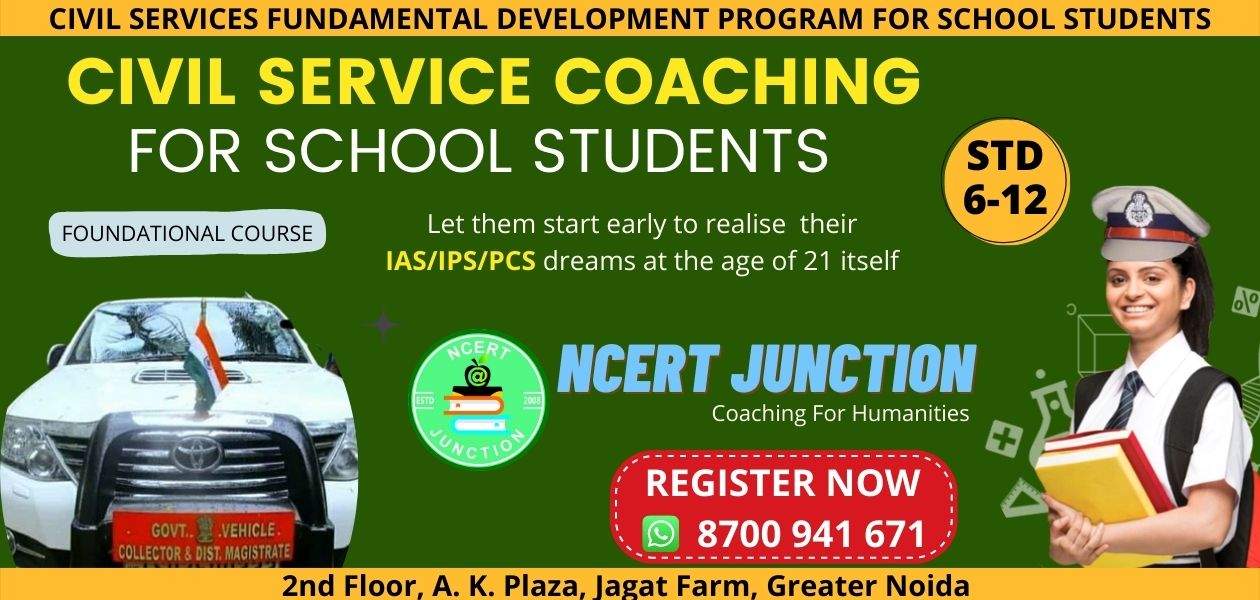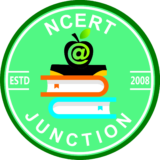CIVIL SERVICES FOUNDATIONAL COACHING FOR SCHOOL STUDENTS

CIVIL SERVICES FOUNDATIONAL COACHING FOR SCHOOL STUDENTS
-> Do you ever wish to see your child to become an IAS / IPS or PCS Officer?
-> Do you know that it’s possible even at the age of 21 itself?
The key success factors in Civil Services Exam are writing skills and analytical and logical thinking. If they acquire these skills from school days, it will help them to crack IAS in the first attempt itself!
NCERT JUNCTION – ‘India’s one of the leading Coaching Center for Humanities, has introduced FOUNDATIONAL COURSES FOR CIVIL SERVICES EXAMINATION FOR SCHOOL STUDENTS (Standard 6 to 12), named ‘Lead IAS Junior’. One of the key highlights of this course is that the curriculum has been prepared by eminent IAS, IPS & PCS officers itself and classes are delivering by reputed faculties from Delhi. Students will be mentored every alternate day by young talents who appeared in the UPSC Interview last year.
One of the exclusive features of this program is that senior IAS/IPS/IFS officers interact directly with our children every month. Lectures are delivered Online / Offline, Monday to Friday & weekend, and one-on-one mentorship sessions are arranged for a short duration everyday evening. Hence, school studies are not at all affected!
Let them start now itself to realise their IAS/IPS/PCS dreams.

Civil Service Foundation Course – School Level
CIVIL SERVICES FOUNDATION COURSE FOR SCHOOL STUDENTS is designed by experts from different subjects to fit out them so that they can crack UPSC Exams in future in 1-2 attempts. The motive behind this program is to provide the training for the students in public speaking, group discussion (GD) on current issues, developing leadership activities, Conducting debates and interview.
We also aim to School Level Students (6 to 12th) who want to crack civil services at 21 age. For this, we have a long-term coaching curriculum to crack the Civil Services Examination (UPSC & State PCS) successfully. From Monday to Friday, we schedule classes for existing syllabus of the student with UPSC syllabus perspective. And then in weekend, we schedule Fundamental Classes for all our students. Generally, our fundamental classes begin in the month of July.
CIVIL SERVICES FOUNDATIONAL COACHING FOR SCHOOL STUDENTS is designed to:
- Extent the correct knowledge about; Civil Service Examination, It’s Pattern, Approach to crack these exams.
- Sharing the basics of notes preparation strategies for such examinations.
- Practice answer writing in certain word limits; It helps in Board exams too.
- Achieve good marks in CUET ENTERENCE TEST after 12th for College Admission.
- Confidence building, Ethical Value development, Communication Development, Personality Development; So that Students from school level can be prepare to face interview panel easily.
- This Foundation Course for School Level Students is designed by a team of experts who are Selected Civil Servants, Civil Service Aspirants & School Teachers.
- Target other possible career options to these school students in various government jobs & Professional Career Options.
- INTERNATIONAL RELATIONS
- India and its Neighbourhood Relations
- Bilateral, regional and global groupings and agreements involving India and public affecting India’s interests.
- Effects of Policies and politics of developed and developing countries on India’s interests.
- Indian Diaspora.
- Important International Institutions, agencies and forums, their structure and mandate.
- GEOGRAPHY
General Geography
- Origin of the Earth: Nature of the Matter Forming the Earth; Geological History of the Earth.
- The Earth and Its Position in the Solar System: The Solar System; the Shape and the Size of the Earth; Location on Earth Surface and Latitude and Longitude; Some Important Parallels and Meridians; Great Circles and Small Circles; Motions of the Earth and Their Effects; Inclination of the Earth’s Axis and Its Effect; Local and Standard Time and the International Dateline; The Solar and the Sidereal Time.
- The Lithosphere: Interior Structure of the Earth; Layers of the Earth; Materials of the Earth’s Crust: Rocks and Minerals; Classification of Rocks.
- Landforms: Landforms of the First Order—Oceans and Continents; Tetrahedral Theory; Continental Drift Theory; Plate Tectonics Theory; Seafloor Spreading; Landforms of the Second Order; Plains; Plateaus; Mountains.
- Forces and Processes Affecting the Earth’s Crust: Internal Forces and their Impact; Volcanic Activity; Types of Volcanic Activity and Volcanoes; Earthquakes; Earthquake Waves; Earthquake Shadow Zone; Origin of Earthquakes; Tsunami; Isostacy.
- External Forces and Their Impact: Weathering; Types of Weathering; Processes involved in Chemical Weathering; Biological Weathering.
- Erosion: Landforms made by Rivers; Landforms made by Glaciers; Landforms made by wind; Coastal Landforms; Landforms made by underground water or Karst Landforms.
- Soils: Classification and Distribution of World Soils; Major Soil Types.
- Atmosphere & Geological Phenomena: Composition; Insolation and Temperature; Atmospheric Pressure; Winds; Humidity; Clouds; Precipitation; Rainfall; Air Masses; Fronts; World Climatic Types and Their distribution; Changes in Critical Geographical features (including water bodies & icebergs); Flora and Fauna, and Effects of such Changes.
- Hydrosphere: Hydrological Cycle; Oceans and Seas; Temperature and Salinity of Ocean; Ocean Currents; Coral Reefs; Marine Resources; Lakes; Wetland.
- Social and World Geography: World Population; Human Development; Migration; Settlement.
- Agriculture and Industries: Introduction; Major Crops; Modern Agricultural practices. Important Industries of the world; Industrialisation in the Developing world.
- Transport and Communication: Transport: Roadways; Railways; Air Transport; Water Transport; Pipeline Transport. Communication: Mass Communication.
- Continents of the World: Asia; Europe; North America; South America; Africa; Australia; Antarctica.
Indian Geography
- Physical Setting: Location; Area and Extent; Administrative Divisions; Geological Aspects of India.
- Physiography: Relief and Physiographic Divisions; The Himalayas; The peninsular Plateau; The Indian Desert; The coastal Plains; The islands.
- Drainage System: Types of Drainage System in India; The Himalayan Rivers; The Peninsular Rivers; Lakes; National Water Grid.
- Climate: Characteristics of Indian Climate; Important Concepts about Origin of Monsoon; The Mechanism of the Indian Monsoon; Seasons; Rainfall Distribution in India; Droughts and Floods.
- Soil and Vegetation: Soil: Major Soils of India; Natural Vegetation of India; Types of Vegetation; Classification of Forests in India; Wildlife in India.
- Agricultural Science: Major Crops, cropping patterns in various parts of the country.
- Population and Settlement: Population: Enumeration of Population in India; Population Growth since 1901; Migration; Tribes of India; Settlements and Urbanisation.
- Resources: Human Resources; Natural Resources; Mineral Resources; Energy Resources; Conventional Sources of Energy; Renewable Energy programmes and Schemes in India; Water Resources; Marine Resources; land Resources in India; Forest Resources.
- Agriculture: Agriculture in India; Cropping Seasons; Green Revolution; Problems of Indian Agriculture; Fertilizer; Live Stock and Dairy Farming; Pisciculture; Sericulture, Horticulture, Floriculture.
- Irrigation: Irrigation in India; Types of irrigation Technique; Irrigation Projects in India.
- Transport and Communication: Transport: Roadways; Railways; Air Transport; Water Transport; Pipeline Transport. Communication: Mass Communication in India. Trade.
- SCIENCE AND TECHNOLOGY
- Science and Technology- developments and their applications and effects in everyday life.
- Achievements of Indians in science & technology; indigenization of technology and developing new technology.
- Awareness in the fields of IT, Space, Computers, robotics, nano-technology,
biotechnology. - Basic Science
- WORLD HISTORY
- History of the World—Including events from the 18th century such as Industrial Revolution, World Wars, Re-drawing of National Boundaries; Colonization; Decolonization; Political Philosophies like Communism; Capitalism; Socialism, etc.; Their forms and effect on the Society
- INDIAN SOCIETY
- Indian Society—Salient Features & diversity of India
- Role of women & Women’s organisations
- Population and Associated issues
- Poverty and Developmental issues
- Urbanisation—problems and remedies
- Effects of globalization on Indian society
- Social empowerment, Communalism, Regionalism and secularism
- INDIAN POLITICS
- Making of the Constitution: Historical Background; Constitutional Developments; Creation of the Constituent Assembly; Objectives Resolution; Drafting; Enactment of the Constitution. Objectives of Constitution. Sources of the Constitution. Preamble and Features of Indian Constitution, Citizenship, Fundamental Rights, The Directive Principles of State Policy, Fundamental Duties, Union Executive, The Parliament and Judiciary.
- ENVIRONMENT AND ECOLOGY
- Introduction: Physical Environment; Biotic Environment—Interaction among Organisms; Ecosystem; Ecosystems and Human Interference.
- Energy Resources: Non-renewable Energy Resources; Renewal Energy Resources; Energy Conservation.
- Biomes and Natural Vegetation: Biomes and Vegetation; Major Biomes of the World; Importance of Forests; Deforestation; Conservation and Management of Forests.
- Solid and Hazardous Wastes: Solid Waste; Hazardous waste.
- Environmental Pollution: Pollution; Pollutants; Kinds of Pollution; Air Pollution; Ozone Layer; Noise Pollution; Radioactive Pollution; Water pollution; Water Pollution; Thermal pollution; Marine pollution; Soil and Land pollution; e-Waste; International Efforts to Protect Environment; Environment protection in India.
- Biodiversity: Levels of Biodiversity; Importance of biodiversity; Biodiversity Hotspots of the world; Biodiversity in India; Conservation of biodiversity; Biosphere Reserves; Environmental laws in India.
- Wildlife in India: List of endangered species in India; Wildlife Conservation Organisations.
- Chemical Threats to Biodiversity: Chemical Toxicology; Toxic Chemicals in Air; Toxic chemicals in water; Toxic chemicals in Soil; Important Chemical Toxicants.
- Climate Change and Global Warming: Climate Change; Continent-wise Effects of Climate change; Global Warming; International Efforts on Climate Change and Global Warming; Mitigation of/and Adaptation to Global Warming.
- HISTORY
- History of India and Indian National Movement.
- ECONOMICS
- Introduction: Branches of Economics; Classification of Economy; Economy of India; Sectors of Indian Economy.
Understanding of some basic economic concepts and development of economic reasoning which the learners can apply in their day-to-day life as citizens, workers and consumers.
Realisation of learners’ role in nation building and sensitivity to the economic issues that the nation is facing today.
- CURRENT AFFAIRS
⇒⇒⇒⇒⇒ Follow us: ⇒⇒⇒⇒⇒
♥ Facebook: – https://www.facebook.com/ncertjunction/
♥ Skype: – https://join.skype.com/Y0n7PswqY6Q7
♥ Twitter: – https://twitter.com/Ncertj
♥ Linkedin: – https://www.linkedin.com/in/ncert-junction/
♥ Telegram: – https://t.me/NcertJunction
♥ Pinterest: – https://in.pinterest.com/junction0696/boards/
♥ Website: – http://ncertjunction.com
♥ Instagram: – https://www.instagram.com/ncertjunction/
♥ Youtube: – https://www.youtube.com/channel/UCzL2Gfk8bnHmkCe358gcAQg?view_as=subscriber
♥ WhatsApp पर +91 95401 77026 से चैट करें : https://api.whatsapp.com/send?phone=919540177026&text=I%27m%20interested%20in%20your%20course%20for%20sale&source=&data=&app_absent=
Call for Online/Offline Classes for Foundation Course: 9540177026
For registration please fill the form: Fix Your Class
Since 2008, We NCERT JUNCTION providing Best offline Coaching Classes for Humanities in Greater Noida. Now we are serving CIVIL SERVICES FOUNDATION COURSE FOR SCHOOL STUDENTS is designed by experts from different subjects to fit out them so that they can crack UPSC Exams in future in 1-2 attempts. The motive behind this program is to provide the training for the students in public speaking, group discussion (GD) on current issues, developing leadership activities, Conducting debates and interview.



